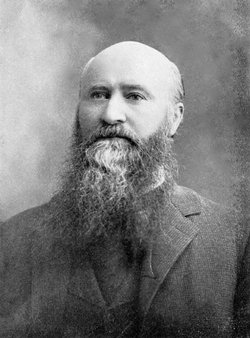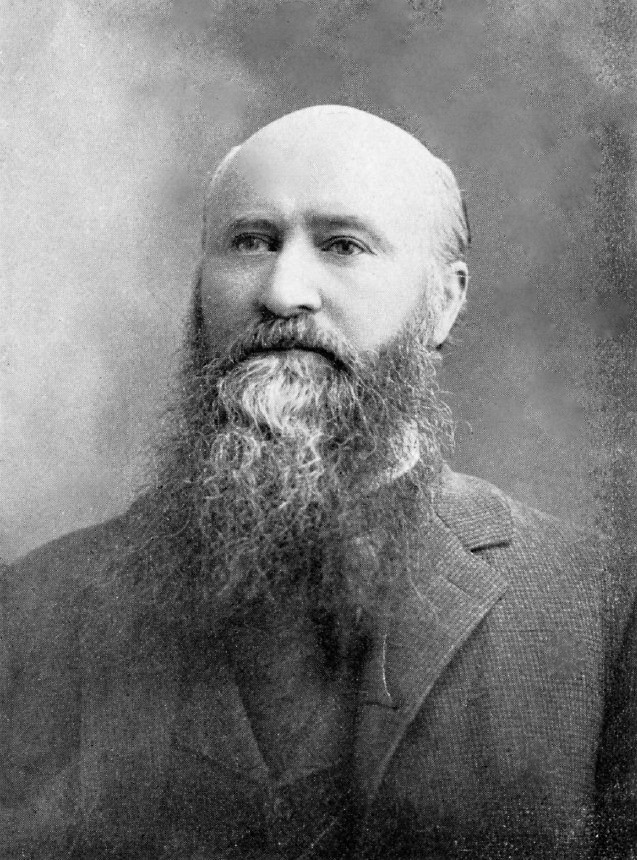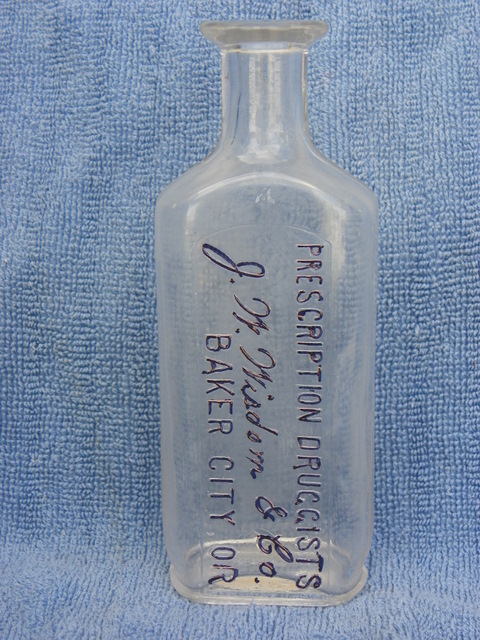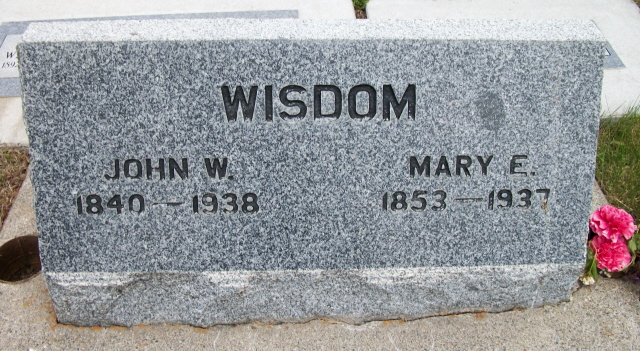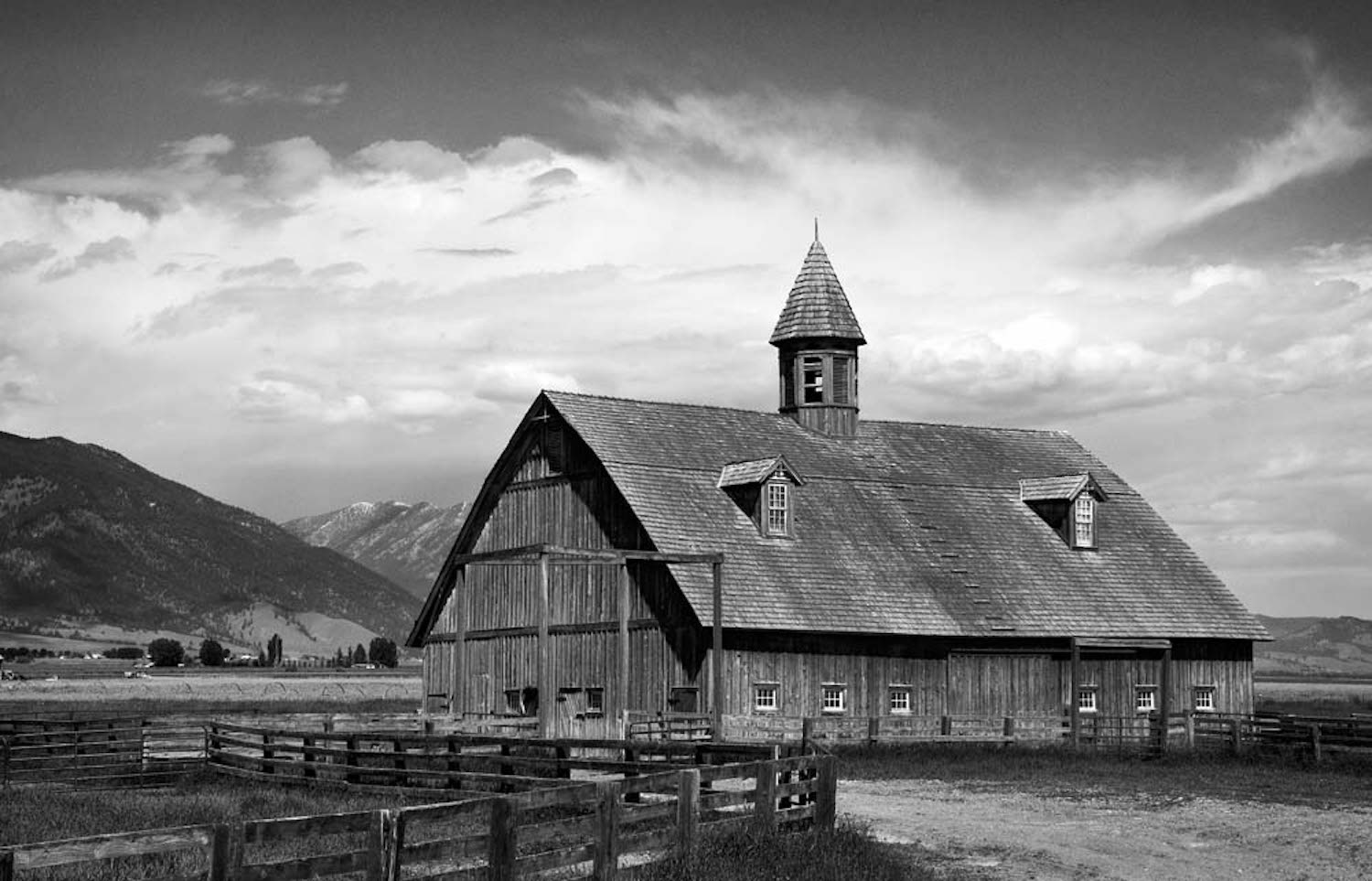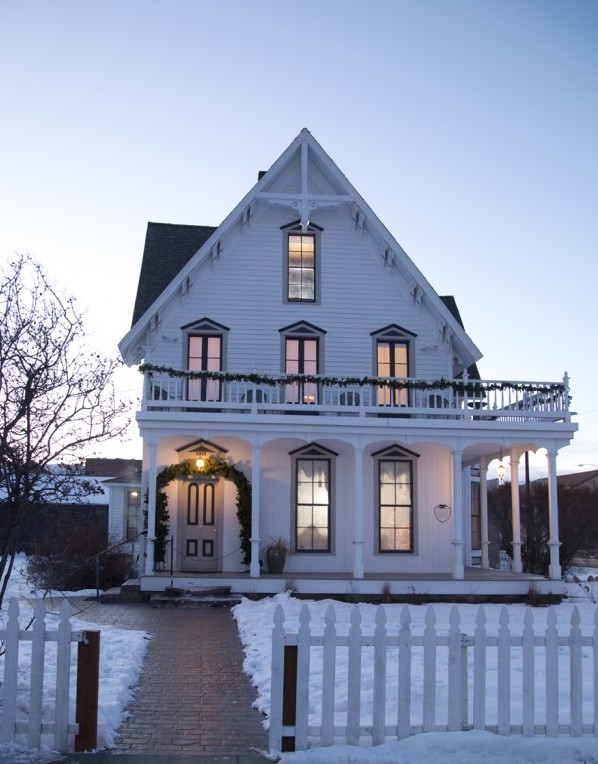Sen. John Wm. Wisdom was born in Randolph Co., Missouri in 1840,the son of Thomas Barnes Wisdom and Lucinda Gess. As a child, he spent a great deal of time at his Grandparent Gess's plantation home,where many fond childhood memories were developed. Upon reaching adulthood and finding himself located in Baker City, Oregon, John Wisdom was preparing to build his family a home. He decided to build that home as a replica of his Grandfather Gess's, where as a child hehad spent so many happy and carefree hours. The task would prove to be grewling. It took one year to build the three story, two parlor home. It would be the first home in Baker City to sport an indoor toilet. The furniture, carpets and draperies were shipped by boat from San Francisco to The Dalles, where they were freighted overland. In spite of the belief that basements were unhealthy, John Wisdom's home had a basement. He insisted on the best of construction,and had the foundation put down six feet into the ground, assuring the sturdiness of a house to last more than his lifetime. The house still proudly stands.
My husband and I visited the home a few summers ago. Now being used as the, "Lovelace Real Estate" office, it's old southern charm still addresses the future with pride. As I stood half dreaming on it's wide sloping porch, I tried to imagine my g/g/g/grandfather standing on the very same type of porch, gazing out at his land and horses and listening to his children at play. Than I thought of what it must have been like the day that the Union soldiers ran him from his home... seperating him from his children, but not his punishing breath.I suppose that if the truth were known he died that day, and not some two years later in Illinois, where he fled. For a few brief moments I was there. Looking out across the wide stretching landscape wherethe sign read, "Randolph Co., Missouri"
~One hot summers day in Baker City, Oregon.
John W. Wisdom
Baker County Oregon Biographies
Baker County Sketch Book
Mr. Wisdom came to Baker County from Missouri in 1862. He went over to the mines of Boise, but returned to Auburn in 1863. From the time of his return from Boise until 1867 he was a teamster. Mr. Wisdom used muled in freighting and made most of his earnings at buying and selling provisions. He would stop at ranches and take on butter or eggs, etc., and sell these to the men at the mines, who had neither time or inclination to tend cows or gardens. Sometimes he hauled for merchants, too, and on one trip handled a piano.
In 1865 Idaho City burned and there was an immediate call for various kinds of provisions, and at high prices. So Mr. Wisdom secured a load of flour in fifty pound sacks. He got as far as Miller's Station, which was the name given to the settlement now called Huntington, and there his off-wheel mule took sick, and there was a delay of ten days. Winter was on. He was advised not to attempt the crossing of the Snake River which was frozen over. The ice, also, was covered by more than two feet of snow, thus making the ice more treacherous. But the young man was not to be stopped by such things. He drove his mules onto the ice, himself walking about thirty feet behind them. The load was heavy. The ice sagged under the weight. Water rose from under the ice hub deep. Wisdom was not tall. Water to the waist, he waded on through, and reached the other shore in safety. At Idaho City he sold his flour at sixteen dollars per fifty pound sack, or sixty-four dollars per barrel. On that trip he made five hundred dollars.
Mr. Wisdom thinks that Eastern Oregon was settled by an unusually good class of people who were bent on making this country a home worth living in. He says that in those early days crime was rather rare as crime in new mining country goes. Sometimes a freighter would have to leave his load on the side of the road for three or four days because of some mishap with team or wagon, and would be gone to find help or repair parts. But on returning he usually found his goods unmolested. Trouble of the pilfering sort was more likely to charged against the Indians. He said the old mountain rule of the " cache" was well observed. Men went away from their lonely cabins leaving the door unlocked, and with fire-wood laid, and perhaps a pot of beans baked and ready to be warmed on his return. A traveler coming to this cabin at night and needing a place to sleep, entered, lit a fire, partook of the beans and other food, and went to bed. Having had his breakfast in the morning, he carefully prepared as much food as he found, laid fresh kindling for the fire and cleaned the cabin, thus leaving it in as good order as when he came, and ready for its owner when he returned tried, hungry and perhaps cold. That was the rule of the mountains.
Mr. Wisdom said that the hardest winter he has known in this district was the winter of 1883 when the temperature was down to near twenty-five below zero for more than ten days, and there was about fifteen inches of snow. In 1888, he said there was one night when the temperature was 38 below zero. He owned a farm at that time, and a report came that his foreman was seriously ill. Mr. Wisdom started out in the severe cold, and though well clothed, froze his cheek, an ear, and his nose. Because of the cold he got off and trotted ahead of his horse for most of the four miles he had to go.
On his farm Mr. Wisdom raised cattle and bred horses. He was much interested in racing. In 1892 he had two hundred and fifty head of horses. About 1890, having been appointed on the national committee of his political party, he attended their meetings in Chicago, and went from there to Kentucky where he purchased eight head of blooded horses. Six of these did the mile in less that 2:30 and one made a record of 2:12 on the Sacramento track. In the eastern Oregon circuit of 1896 his horses never lost a race.
Mr. Wisdom owned the race track near Baker City; and it was through his attempt to bring water to the track to keep it properly cared for that the idea of irrigation got its start in this district. He said that when he first talked of bringing water to the track he was laughed at, but that after it had been done, some of the rachers nearby began to profit, by his ditched and the sub-irrigation from them.
In 1867 Mr. Wisdom opened a drug store in Baker, the first drug-store and among the first stores of any kind in the frontier town.
At the very advanced age of 96 Mr. Wisdom underwent a major operation, and so nicely has he recovered that he now walks about on the business streets with as much show of vitality as many a man of sixty. I found it a bit hard however, to conduct this interview on account of failing hearing and the fact that he had an unusually light voice and speaks with some hesitancy. His memory of early incidents and his own experiences seems clear and there is little or no evidence of the exaggerations so often found among aged people.
In his home, which was built in 1878, there are several pieces of furniture made in Baker City by Mr. Dodge, the first furniture maker in Baker City. Among them are a four-poster bed, a dresser and some chairs.
John and Mary Elizabeth had these children:
William T. Wisdom b. 1869
Frances W. Wisdom b. 1872
Fanny Kate Wisdom b. 1872
Vesper Wisdom b. 1875
Loy Winter Wisdom b. 9 Jan 1886
Mable Gertrude Wisdom b. Oct 1888
Glen Albert Wisdom b. Nov. 1890
John W. Wisdom b. Aug 1892
Ada Wisdom b.
Frank Wisdom b.
Margaret Wisdom b.
Sen. John Wm. Wisdom was born in Randolph Co., Missouri in 1840,the son of Thomas Barnes Wisdom and Lucinda Gess. As a child, he spent a great deal of time at his Grandparent Gess's plantation home,where many fond childhood memories were developed. Upon reaching adulthood and finding himself located in Baker City, Oregon, John Wisdom was preparing to build his family a home. He decided to build that home as a replica of his Grandfather Gess's, where as a child hehad spent so many happy and carefree hours. The task would prove to be grewling. It took one year to build the three story, two parlor home. It would be the first home in Baker City to sport an indoor toilet. The furniture, carpets and draperies were shipped by boat from San Francisco to The Dalles, where they were freighted overland. In spite of the belief that basements were unhealthy, John Wisdom's home had a basement. He insisted on the best of construction,and had the foundation put down six feet into the ground, assuring the sturdiness of a house to last more than his lifetime. The house still proudly stands.
My husband and I visited the home a few summers ago. Now being used as the, "Lovelace Real Estate" office, it's old southern charm still addresses the future with pride. As I stood half dreaming on it's wide sloping porch, I tried to imagine my g/g/g/grandfather standing on the very same type of porch, gazing out at his land and horses and listening to his children at play. Than I thought of what it must have been like the day that the Union soldiers ran him from his home... seperating him from his children, but not his punishing breath.I suppose that if the truth were known he died that day, and not some two years later in Illinois, where he fled. For a few brief moments I was there. Looking out across the wide stretching landscape wherethe sign read, "Randolph Co., Missouri"
~One hot summers day in Baker City, Oregon.
John W. Wisdom
Baker County Oregon Biographies
Baker County Sketch Book
Mr. Wisdom came to Baker County from Missouri in 1862. He went over to the mines of Boise, but returned to Auburn in 1863. From the time of his return from Boise until 1867 he was a teamster. Mr. Wisdom used muled in freighting and made most of his earnings at buying and selling provisions. He would stop at ranches and take on butter or eggs, etc., and sell these to the men at the mines, who had neither time or inclination to tend cows or gardens. Sometimes he hauled for merchants, too, and on one trip handled a piano.
In 1865 Idaho City burned and there was an immediate call for various kinds of provisions, and at high prices. So Mr. Wisdom secured a load of flour in fifty pound sacks. He got as far as Miller's Station, which was the name given to the settlement now called Huntington, and there his off-wheel mule took sick, and there was a delay of ten days. Winter was on. He was advised not to attempt the crossing of the Snake River which was frozen over. The ice, also, was covered by more than two feet of snow, thus making the ice more treacherous. But the young man was not to be stopped by such things. He drove his mules onto the ice, himself walking about thirty feet behind them. The load was heavy. The ice sagged under the weight. Water rose from under the ice hub deep. Wisdom was not tall. Water to the waist, he waded on through, and reached the other shore in safety. At Idaho City he sold his flour at sixteen dollars per fifty pound sack, or sixty-four dollars per barrel. On that trip he made five hundred dollars.
Mr. Wisdom thinks that Eastern Oregon was settled by an unusually good class of people who were bent on making this country a home worth living in. He says that in those early days crime was rather rare as crime in new mining country goes. Sometimes a freighter would have to leave his load on the side of the road for three or four days because of some mishap with team or wagon, and would be gone to find help or repair parts. But on returning he usually found his goods unmolested. Trouble of the pilfering sort was more likely to charged against the Indians. He said the old mountain rule of the " cache" was well observed. Men went away from their lonely cabins leaving the door unlocked, and with fire-wood laid, and perhaps a pot of beans baked and ready to be warmed on his return. A traveler coming to this cabin at night and needing a place to sleep, entered, lit a fire, partook of the beans and other food, and went to bed. Having had his breakfast in the morning, he carefully prepared as much food as he found, laid fresh kindling for the fire and cleaned the cabin, thus leaving it in as good order as when he came, and ready for its owner when he returned tried, hungry and perhaps cold. That was the rule of the mountains.
Mr. Wisdom said that the hardest winter he has known in this district was the winter of 1883 when the temperature was down to near twenty-five below zero for more than ten days, and there was about fifteen inches of snow. In 1888, he said there was one night when the temperature was 38 below zero. He owned a farm at that time, and a report came that his foreman was seriously ill. Mr. Wisdom started out in the severe cold, and though well clothed, froze his cheek, an ear, and his nose. Because of the cold he got off and trotted ahead of his horse for most of the four miles he had to go.
On his farm Mr. Wisdom raised cattle and bred horses. He was much interested in racing. In 1892 he had two hundred and fifty head of horses. About 1890, having been appointed on the national committee of his political party, he attended their meetings in Chicago, and went from there to Kentucky where he purchased eight head of blooded horses. Six of these did the mile in less that 2:30 and one made a record of 2:12 on the Sacramento track. In the eastern Oregon circuit of 1896 his horses never lost a race.
Mr. Wisdom owned the race track near Baker City; and it was through his attempt to bring water to the track to keep it properly cared for that the idea of irrigation got its start in this district. He said that when he first talked of bringing water to the track he was laughed at, but that after it had been done, some of the rachers nearby began to profit, by his ditched and the sub-irrigation from them.
In 1867 Mr. Wisdom opened a drug store in Baker, the first drug-store and among the first stores of any kind in the frontier town.
At the very advanced age of 96 Mr. Wisdom underwent a major operation, and so nicely has he recovered that he now walks about on the business streets with as much show of vitality as many a man of sixty. I found it a bit hard however, to conduct this interview on account of failing hearing and the fact that he had an unusually light voice and speaks with some hesitancy. His memory of early incidents and his own experiences seems clear and there is little or no evidence of the exaggerations so often found among aged people.
In his home, which was built in 1878, there are several pieces of furniture made in Baker City by Mr. Dodge, the first furniture maker in Baker City. Among them are a four-poster bed, a dresser and some chairs.
John and Mary Elizabeth had these children:
William T. Wisdom b. 1869
Frances W. Wisdom b. 1872
Fanny Kate Wisdom b. 1872
Vesper Wisdom b. 1875
Loy Winter Wisdom b. 9 Jan 1886
Mable Gertrude Wisdom b. Oct 1888
Glen Albert Wisdom b. Nov. 1890
John W. Wisdom b. Aug 1892
Ada Wisdom b.
Frank Wisdom b.
Margaret Wisdom b.
Family Members
Sponsored by Ancestry
Advertisement
Explore more
Sponsored by Ancestry
Advertisement
